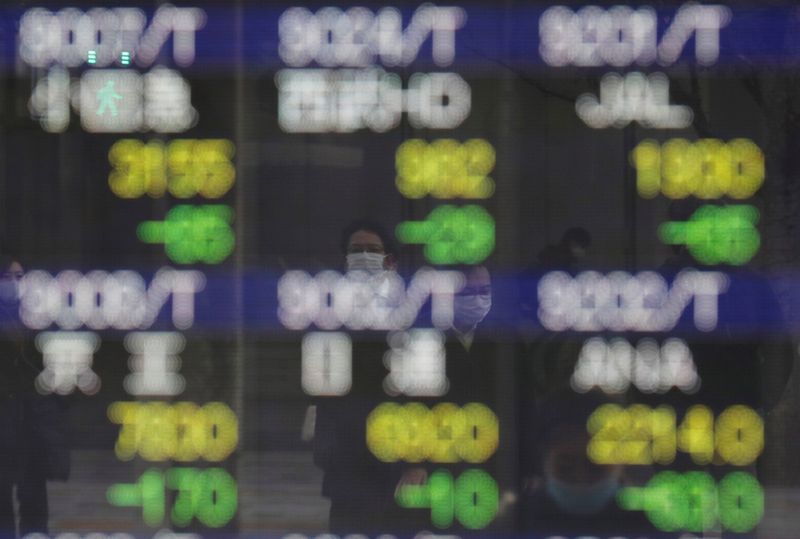By Tom Arnold and Swati Pandey
LONDON/SYDNEY (Reuters) - Global stocks wavered on Wednesday while the safe-haven dollar held near five-month highs as Treasury yields resumed their upward march before U.S. President Joe Biden announces a multitrillion-dollar plan to rebuild America's infrastructure.
The relentless rise of U.S. bond yields, with 10-year yields on course for their biggest quarterly rise since the fourth quarter of 2016, weighed on sentiment even as Chinese data suggested a solid global economic recovery.
Europe's regional STOXX 600 index was up 0.2%, on course for its second straight month of gains. Britain's FTSE 100 was down 0.1% as shares in online food delivery firm Deliveroo slumped as much as 30% on their first day of trading.
Britain's economy grew more than expected, 1.3%, in the final quarter of last year, but still shrank the most in more than three centuries in 2020 as a whole. (Graphic: Deliveroo shares plunge in London debut, https://fingfx.thomsonreuters.com/gfx/mkt/jznpngamxvl/Deliveroo.png)
E-mini futures for the S&P 500 (ESc1) were a shade higher.
Some global banks are facing billions of dollars in losses after U.S. investment firm Archegos Capital Management defaulted on margin calls, putting investors on edge about who else might be exposed.
But focus for much of the quarter has been on the surge in bond yields, making equity valuations look lofty, particularly for major tech companies that have borne the brunt of the sell-off.
On Wednesday, 10-year Treasury yields rose as high as 1.746% from Tuesday's 1.708% and were last at 1.723%.
Euro zone bonds calmed, but Germany's 10-year yield was set for its biggest quarterly jump since the fourth quarter of 2019.
Investors were looking ahead to Biden's trip to Pittsburgh on Wednesday, where he is expected to push for a "Build Back Better" plan. Its price tag could be as high as $4 trillion to pay for conventional roads and bridges while also tackling climate change and domestic policy issues like income equality.
"The plans as announced have a long and tortuous journey to make it through Congress and thus the end result is likely to be nine months or more away and may well look very different indeed once it has been through that political wranglings on the Hill," said James Athey, investment director at Aberdeen Standard Investments. "If investors are weighing the risks appropriately, there shouldn't be much impact on markets in the short term."
MSCI's All Country World Index, which tracks stocks across 49 countries, traded 0.1% lower.
MSCI's broadest index of Asia-Pacific shares outside of Japan fell 0.3%, its first monthly loss in five months.
Sentiment in Asia remained downbeat despite data showing China's factory activity expanded faster than expected in March. Chinese services surged, too.
China's blue-chip index sank 0.9% and Japan's Nikkei slid 0.9% as investors sold financial shares amid growing uncertainty over the fallout from the margin calls that brought down Archegos Capital.
In foreign-exchange markets, currencies were lower against the U.S. dollar. The dollar hit a one-year high of 110.48 against the yen as investors bet fiscal stimulus and aggressive vaccinations would boost the U.S. economic recovery. [FRX/]
The dollar is on track for a third straight monthly rise against the yen and its biggest since the end of 2016.
The dollar index held above 93 after surging as high as 93.357 on Tuesday. It has climbed from close to 90 at the start of March, on course for its best month since 2016.
In commodities, Brent crude rose 0.5% to $64.47 a barrel. U.S. crude added 0.6% to $64.53 barrel.

Gold prices slipped to 1,684.40 an ounce.